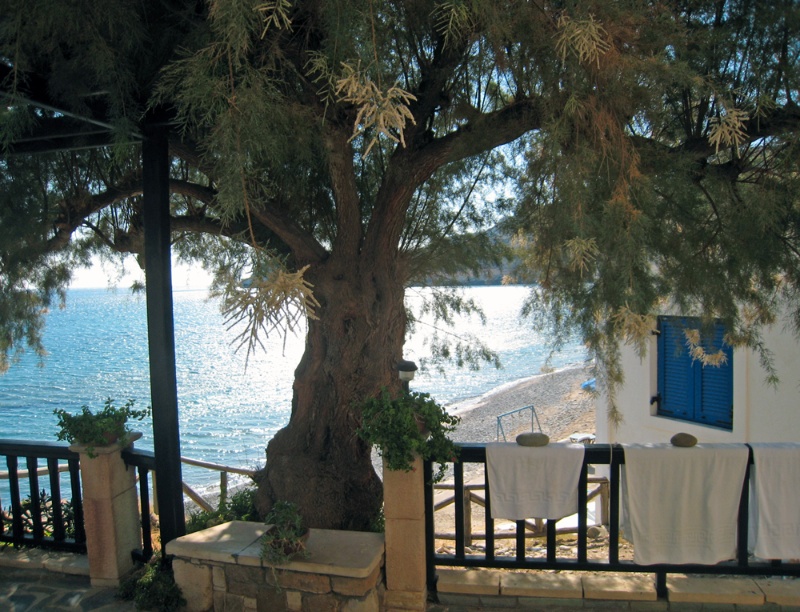On our last morning at Káto Zákros, we had a small breakfast, beginning with some peach juice and a banana from the supplies we’d picked up in the grocery at Zákros. After that we went down and had coffee (me) and tea (Dorothea), plus some yogurt and honey. We packed our bags and sat reading on the terrace until 12:30. At that point a woman showed up to clean our room, so we took our luggage and our respective devices downstairs to the tavérna to read. At 1:00 we ordered lunch: I had the day’s special, pork stewed with leeks (and very good it was); Dorothea had pastitso, which she describes as “fabulous and huge,” confessing “I ate it all.” The shared part of our meal was a Greek (choriátiko) salad, and for once we passed on wine.
When lunch was finished, we stayed at our table under the shade of the tavérna’s roof, waiting for Yiánni and his taxi. Dorothea was talking with Níkos and the waiter, a handsome young man whom we hadn’t seen previously. He may have been there because the weekend was beginning and the tavérna would be somewhat busier (though it was close to the end of the season, and we hadn’t seen signs of a crowd yet). Dorothea asked them about a dance that she had learned as a girl, which Greek-Americans call the Kritikó (that is, ‘the Cretan [dance]’). She took Níkos’ hand and and did a few steps by way of illustration.
Níkos assured her that this Kritikó is a Cretan dance, but only one of many. Cretans call it the Chaniátiko (‘the Chaniá [dance]’), which associates it more precisely with the place it belongs to. Dorothea also asked them about a popular dance she knows as the Kalamatianó, and the waiter assured her that it was indeed associated with the city of Kalamáta, on the mainland.
Níkos and the waiter showed her the steps of a few more Cretan dances. And, in answer to another question, the waiter confirmed that the name of the Peloponnesian town of Gargaliáni, where Dorothea’s father was born, is based on the word for ‘tickle.’ I decline to speculate on what might explain a community of hard-working famers being named “Tickletown.”
When lunch was finished, we stayed at our table under the shade of the tavérna’s roof, waiting for Yiánni and his taxi. Dorothea was talking with Níkos and the waiter, a handsome young man whom we hadn’t seen previously. He may have been there because the weekend was beginning and the tavérna would be somewhat busier (though it was close to the end of the season, and we hadn’t seen signs of a crowd yet). Dorothea asked them about a dance that she had learned as a girl, which Greek-Americans call the Kritikó (that is, ‘the Cretan [dance]’). She took Níkos’ hand and and did a few steps by way of illustration.
Níkos assured her that this Kritikó is a Cretan dance, but only one of many. Cretans call it the Chaniátiko (‘the Chaniá [dance]’), which associates it more precisely with the place it belongs to. Dorothea also asked them about a popular dance she knows as the Kalamatianó, and the waiter assured her that it was indeed associated with the city of Kalamáta, on the mainland.
Níkos and the waiter showed her the steps of a few more Cretan dances. And, in answer to another question, the waiter confirmed that the name of the Peloponnesian town of Gargaliáni, where Dorothea’s father was born, is based on the word for ‘tickle.’ I decline to speculate on what might explain a community of hard-working famers being named “Tickletown.”
Yiánni arrived at 2:30, as we’d agreed. We said goodbye to Níkos and his staff, whose picture Dorothea had just taken, loaded our bags into the Mercedes, and began the journey back over the mountains to Sitía. On the way up to Zákros he pointed out the place where many walkers enter the Gorge of the Dead, and Dorothea asked him if he’d ever walked it. He shuddered and said that he never had and never would; that kind of hike was, as far as he was concerned, an exteme sport. The previous year, he told us, a man had broken his ankle down in the gorge, and the EMTs refused to go in and get him. It took hours to make arrangements to get the poor guy carried out. Crete, said Yiánni, doesn’t yet have a well-developed system for dealing with emergencies of that kind. We had obviously been right to judge that we weren’t sure-footed enough to make the attempt.


